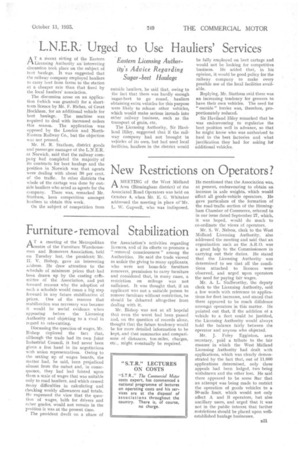Furniture-removal Stabilization
Page 35

If you've noticed an error in this article please click here to report it so we can fix it.
AT a meeting of the Metropolitan centre of the Furniture Warehousemen and Removers Association, held on Tuesday last, the president, Mr. H. V. Bishop, gave an interesting address. He drew attention to the schedule of minimum prices that had been drawn up by the costing cc■frimittee of the Association, and put forward reasons why the adoption of such a schedule would mean a big step forward in any future stabilization of prices. One of the reasons that stabilization was necessary was because it would be useful evidence when appearing before the Licensing Authority and objeting to a rival in regard to rate-cutting.
Discussing the question of wages, Mr. Bishop deplored the fact that, although the trade had its own Joint Industrial Council, it had never been given a free hand in its negotiations with union representatives. Owing to the setting up of wages boards, the matter had, he said, been prejudiced almost from the outset and, in consequence, they had had foisted upon them a scale of wages that was suitable only to road hauliers, and which caused Many difficulties in calculating and checking weekly allowances and totals. He expressed the view that the question of wages; bOth for drivers and other grades, would not remain in the position it was at the present time.
The president dwelt on a Phase of
the Association's activities regarding licences, and of its efforts to promote a "removal consciousness " among the Authorities. He said the trade viewed as unfair the giving to many applicants; who were not bona-fide furniture removers, permission to carry furniture and considered that, in many cases, a restriction on mileage was not sufficient. It was thought that, if an applicant was not a suitable person to remove furniture without restriction, he should be debarred altogether from dealing with it.
Mr. Bishop was not at all hopeful that even the worst had been passed and, on the question of records alone, thought that the future tendency would be for more detailed information to be kept, and that summaries and comparisons of distances, ton-miles, charges, etc., might eventually be required.




























































































